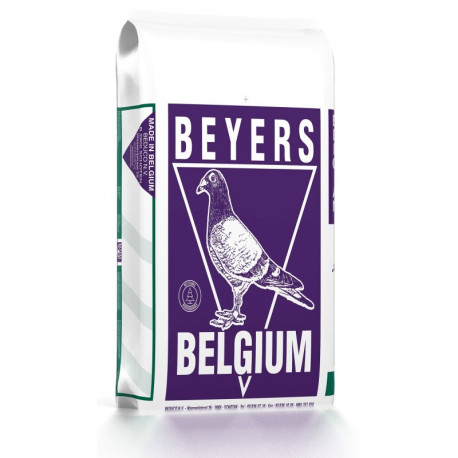- In the process of being restocked






Reference: 002599
The flaxseed consists of 40 to 45% oil and 25% protein. Flaxseed preserves very well. It contains, in particular, two fatty acids with similar names (both derived from the word "lin"), linolenic acid (an omega-3) and linoleic acid.
The seed is used in animal feed, particularly for laying hens for which an increase in the omega-3 content of the eggs is desired.
Due to these properties, this seed aids digestion.
The flaxseed consists of 40 to 45% oil and 25% protein. Flaxseed preserves very well. It contains, in particular, two fatty acids with similar names (both derived from the word "lin"), linolenic acid (an omega-3) and linoleic acid.
The seed is used in animal feed, particularly for laying hens for which an increase in the omega-3 content of the eggs is desired.
Due to these properties, this seed aids digestion.
Peeled peanuts are very popular treats for parrots.
They are to be distributed sparingly because they are rich.
Ideal food to fill your wild bird dispensers, they will bring the necessary fat to the birds to spend the winter more easily.
The favorite of chickadees and a real treat for many birds.
Niger seed is a bird seed rich in phosphorus and calcium.
Niger seeds (or nyjer seeds) are fine seeds rich in oil.
They come from Guizotia abyssinica (also called Oleiferous Guizotia).
Niger is very popular with most birds, goldfinches and tarins love it.
Niger is one of the few bird seeds with a good calcium/phosphorus ratio.
Paddy rice seed or raw rice which is perfect for exotic big-beaked birds such as padda and birds of Asian descent. This seed is also appreciated by parakeets, parrots and exotic doves.
Foniopaddy Seed is a natural grass seed grown on our plantations in Uganda. Scientific research has shown that Foniopaddy has a beneficial effect on coccidiosis.
Pine seeds are a good source of Phosphorus, Magnesium, Zinc, Manganese, Copper, Iron, Vitamin E, K, B1, B2, B3, B9.
Chia is a sage. It is an annual plant that can reach up to 1 meter in height, with the scientific name Salvia hispanica.
The composition of chia seeds closely resembles that of other mucilaginous seeds like flaxseeds and psyllium. Unlike flaxseeds, chia does not have anti-nutritional factors, which limit the use of flaxseeds without prior heat treatment. Anti-nutritional factors are cyanogenic glucosides or linatins, inhibitors of vitamin B6 that prevent its action. Moreover, chia has a much more pleasant taste than flaxseeds, and birds consume it more readily.
Yellow millet is rich in vitamins and minerals and is an alkaline (non-acidic) cereal. It is part of the basic diet of parakeets, exotic birds and exotic doves.
Millet contains magnesium, phosphorus, iron, potassium, manganese, vitamin A, vitamin B1, vitamin B2, vitamin PP (nicotinic acid) and vitamin B5.
Foniopaddy Seed is a natural grass seed grown on our plantations in Uganda. Scientific research has shown that Foniopaddy has a beneficial effect on coccidiosis.
Sunflower seed contains almost 40% fat, but also proteins, carbohydrates, vitamins B and E. We quantify on a sunflower seed nearly 600 Kcalories per 100 g.
It satisfies throughout the year, the needs of a wide variety of birds, including the smallest of them.
Sunflower seeds are a real treat for our birds who love them!
Clover stimulates the immune system and slows down cellular ageing through its excellent antioxidant properties. Rich in vitamins B, C, E and provitamin A.
High-quality raw material for pigeons and chickens.
Superior quality.
Deep cleaned repeatedly.
Dust-free.
Flaxseed is rich in omega 3, which is essential for the cardiovascular system.
High-quality seeds with high fat content
- With a high content of vitamin E, B9, B5, B6, B1, B2, B3, and vitamin K.
- It has antioxidant properties.
- Excellent energy contribution.
- Rich in calcium, potassium, magnesium, phosphorus, proteins, zinc, thiamine, pectin (cleanses the body).
Canary grass is a nutritious seed particularly appreciated by many birds. Its high protein and fibre content makes it an essential food for the good health and vitality of birds. It is especially ideal for canaries, budgerigars, serins, and other small exotic birds.
Characteristics:
- Ingredients: 100% natural canary grass.
- Appearance: Elongated seeds, from pale yellow to light brown in colour.
- Nutritional Value: Rich in proteins (about 16%), fibres, and essential amino acids.
- Benefits:
- Promotes good digestion thanks to its fibre content.
- Contributes to the shine of plumage.
- Provides the necessary energy for birds' daily activities.
Millet is used in the diet of all birds: straight beaks and hooked beaks. In bunches, it's a treat they love.
Cluster millet has a good protein and carbohydrate content and also contains a large number of amino acids. Ideal for distracting your birds and thus avoiding pecking (feather pulling).
Clover stimulates the immune system and slows down cellular ageing through its excellent antioxidant properties. Rich in vitamins B, C, E and provitamin A.

The flaxseed consists of 40 to 45% oil and 25% protein. Flaxseed preserves very well. It contains, in particular, two fatty acids with similar names (both derived from the word "lin"), linolenic acid (an omega-3) and linoleic acid.
The seed is used in animal feed, particularly for laying hens for which an increase in the omega-3 content of the eggs is desired.
Due to these properties, this seed aids digestion.
